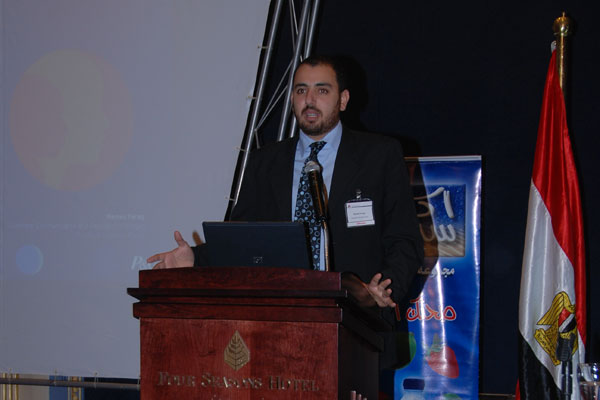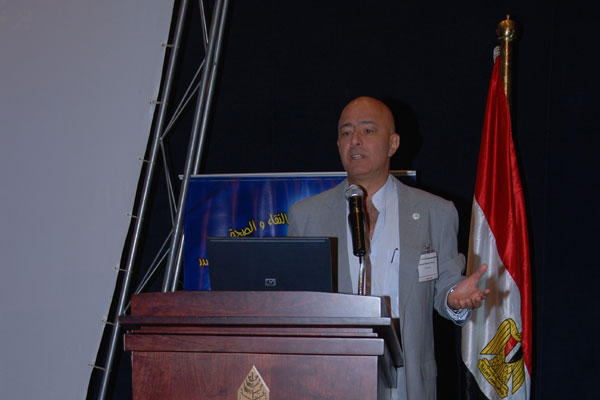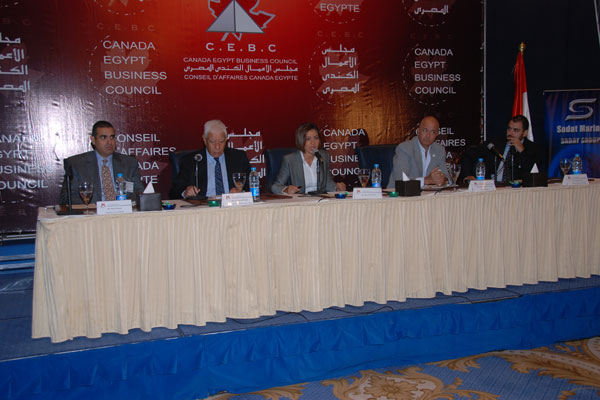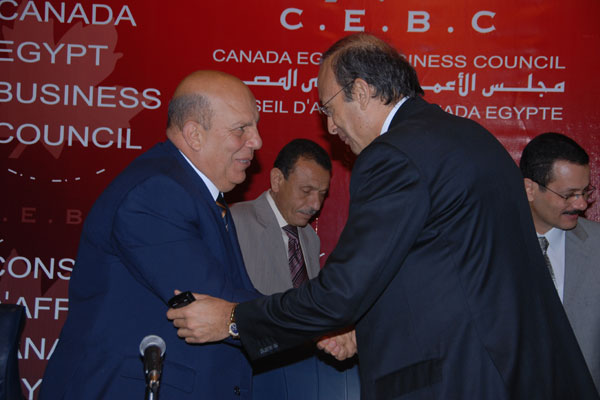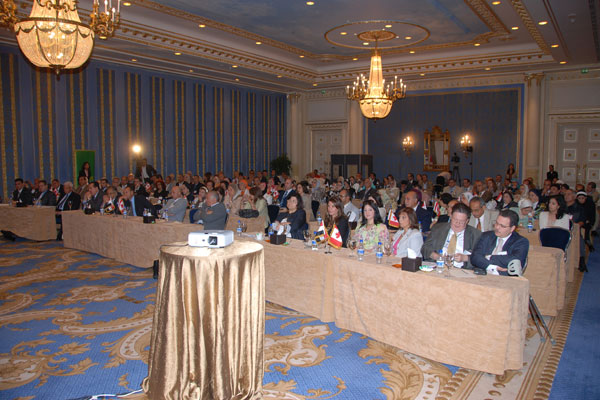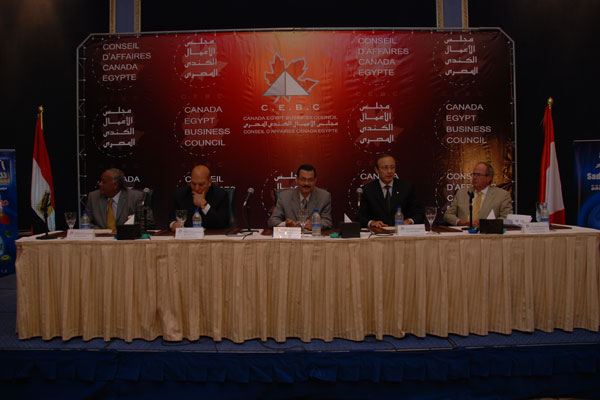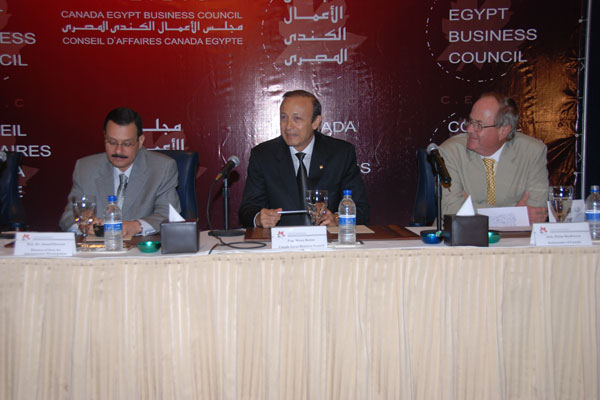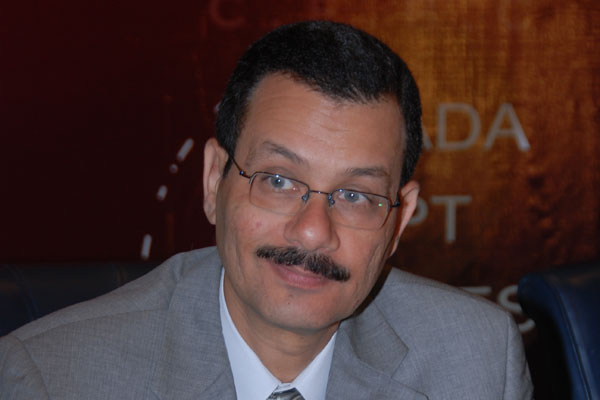
Date
Speaker(s)
Designation
Description
“A Follow Up Meeting in Alexandria on: The Responsibility of the Egyptian Society towards Low Income”
The Canada Egypt Business Council ‘CEBC’ held its first event in Alexandria at the Four Seasons Hotel, in cooperation with the Social Fund for Development (SFD). The conference was held as a follow-up meeting to discuss the recommendations and feedback in response to the success acknowledged by the previously held conference in Cairo, entitled ‘The Responsibility of the Egyptian Society towards Low Income’.
The one-day conference featured a number of prominent speakers, H.E. Dr. Ahmed Darwish, Egypt’s Minister of State for Administrative Development as the keynote speaker. The list of speakers incorporated a number of government officials including Gen. Adel Labib, Governor of Alexandria, as well as a number of high officials from various NGOs and business organizations.
First Session:
“The Government Plans to Improve the Living Standards of Low Income People”
The plenary session, focused on the business community’s role in partnership with governments and NGOs to tackle deeper issues that can lead to sustainable economic growth and raise living standards. Mr. Motaz Raslan, Chairman of the ‘CEBC’, commenced his opening remarks by acknowledging the distinguished guests in attendance. He went on to explain the importance of activating the role of civil society to alleviate high prices and the negative impact of globalization and changes in world prices and its various gloomy effects on Egypt’s low income people. “The low income people signify the main segment in the Egyptian society and contributes more than 80 percent of Egyptian population, and in accordance to the acceleration of globalization along with the implementation of the Egyptian economy of free market policies, the low income people have certainly been negatively affected”, added Mr. Raslan.
He also affirmed that the business and civil communities are in urgent need to understand the role of business enterprises in the balance of the social security networks. “Private Sector’s social responsibility is a business essential, which is not a mere sort of donation or endowments, but stems as a national economic and social obligation towards the society. The private sector in Egypt is currently being perceived as a development agent and a leading force for economic growth. The current policies are geared to private business development, however business leaders, in return have a major role to play in reinforcing social security through sharing in upholding the success of service projects that may contribute in removing some of the shoulder burden on low income people. Such contributions can play a key role in achieving the goals of social justice to enable the reach of our national economic and social growth potential and prosperity”, said Raslan.
He then introduced Ambassador Philip MacKinnon, Canada’s former ambassador to Egypt, who started his opening remarks highlighting the role of the Canadian Embassy in Egypt in developing a framework for Canadian Egyptian cooperation relations in the areas of development. This framework of action has been implemented through many Egyptian governmental sectors including the Ministry of Finance, Ministry of Industry, as well as the Social Fund for Development (SFD) through supporting small and medium enterprises (SMEs), as the basic creator for job opportunities that can play a vital role in breaking the cycle of poverty in Egypt.
The ambassador further elucidated that the private sector together with other civic groups and NGOs have a crucial role to play in building the wide-ranging partnership necessary for promoting sustainable economic and social development in Egypt. He added that such goals could be achieved through maintaining two important measures, which are education and employment that serve as the nucleus for the advancement of any nation leading to poverty alleviation and economic affluence. Moreover, the ambassador finally discussed the importance of women empowerment together with maintaining the public trust and confidence in the future that can lead to upholding the stability in social security.
The third guest speaker was Mr. Azmy Mostafa, Deputy General Manager, Social Fund for Development, who gave an outline about the main targets of the SFD explaining that it targets three social classes: middle-lower income, the economically active poor and the poor class. “SFD supports the small and medium enterprises SMEs, which are the main “job opportunity” generators, thus contributing to national economy advancement. The SFD activities include cost effectiveness of funding specially in micro credit enterprises, which increase the income of beneficiaries leading to improvement of their living standards. The funds are distributed by banks, NGOs and post offices, in addition to the SFD branches spread across twenty-eight governorates”, said Mr. Azmy. He further added that the Social Fund for Development pumped 12 billion Egyptian pounds into various fields generating millions of employment opportunities, and this reflects the effectiveness of the SFD funding process.
H.E. Dr Ahmed Darwish, Egypt’s Minister of State for Administrative Development then took the podium delivering a forceful speech stating that the government is working with determination since its appointment to foster sustainable economic growth in order to raise living standards. “Our long-term vision of development includes two main goals: achieving high and sustainable growth and alleviating poverty and income disparity. To this end, we are implementing national development plans seeking to achieve growth by maximizing the role of the private sector as a catalyst for development, as well as changing the task of the government in managing the economy”, noted the minister.
The plan, Dr. Darwish explained, recognized the components that must be present in a country in order to achieve good governance, two of the most important are being a government body that is effective and efficient, as well as the active participation of the civil society.
Moreover, he added that over the past few years, economic reform has been on top of the government’s agenda, focusing on changing the business environment to facilitate investment by providing clear and stable investment policies and regulations, as well as improving the interface between business and government. “Within a relatively short period, these reforms succeeded in boosting our GDP and FDI, leading to increasing government capacity, aids as well as social incentives that target low income people”, commented Dr. Darwish.
The minister further asserted that aid and solidarity are the first and the foremost principles of the government plan. This support is aiming at providing security for pension beneficiaries, increase spending on education that has currently reached 35 billion pounds and sustain financial support in the form of subsidized food commodities.
Finally, Dr. Darwish stated that the main objective of the government is to bridge a long-term integrated cooperative relations with the civil society based on mutual trust, enabling the provision of financial assistance and aid to the low income segments of the society. These broaden concepts of cooperation may lead to reducing poverty, securing peace, and solidarity among all segments of the society, yet boosting sustainable economic development.
The final speaker in this session, H.E. Gen. Adel Labib, Governor of Alexandria, started his presentation by welcoming all the attendees to Alexandria and expressing his delight for having this conference held there coinciding with the celebrations of choosing Alexandria as the capital of Islamic culture for the year 2008.
His Excellency, the governor went on explaining the significance of the theme of the conference that covers the major segment of the Egyptian society, who are the “low income people”. He affirmed that the government spares no effort in providing direct support and appropriate legislation to alleviate the effect of inflation upon this segment of the society. “However we cannot ignore the positive role that is played by the private sector, the civil society, and NGOs in progressing the social solidarity and peace among the Egyptian society. This role entails the private sector to work closely with the government on poverty reduction as well as providing transactions and services covering health, education, and housing, generating employment opportunities that may lead to raising living standards of poor people, and advocating the human rights culture that became an indicator of the development of any nation”, said Gen. Labib.
Gen. Labib then concluded that Alexandria has had a major role to play throughout the ages in promoting a culture of interdependence and solidarity among its citizens by offering accountability, modernizing civil services as well as promoting development and decentralization leading to sustainable social and economic growth that is highly noticed.
Following the main speakers speeches, the floor was then opened for questions covering significant issues including corporate social responsibility versus goodwill, UN millennium development goals (MDGs), Geographic Information Systems (GIS), the E-government and the Participation Index showing how the public is interacting with those electronic services as well as Demographic Information Systems.
Second Session:
“The Social Responsibility of Private Sector towards the Low Income People”
This session was held to signify the importance of the social accountability of the private sector towards low income and how to activate this role. It aimed at demonstrating the successful experiences of the private sector in helping low income through charitable organizations established for this purpose. The session was kicked off by Mr. Mohamed Ragab, Chairman, Alexandria Business Association, who outlined the role of ABA in providing support to the private sector as well as developing and promoting the welfare of the business community. He further explained that ABA has managed to emphasize the concept of business and social cooperation among members that soon developed beyond advocacy to encompass community service. “This was applied through implementing a proactive approach for improving Alexandria’s role as an imperative business hub in the region by enhancing workforce education and training”. In addition, Mr. Ragab added that the main activities of the ABA involve sustaining Small & Micro Enterprise Projects (SMEs) to increase their productivity and help them adopt new technologies through the provision of loans and offering regular guidance for these projects. This is in addition to the Mubarak Program for Dual Education, Alexandria Center for International Arbitration, Feeding the Poor Project, Towards Self-Employment Project, and finally the Orphans Sponsorship Project.
Mr. Sameh Makram Ebeid, Board Member of Al Tadamun, delivered a presentation highlighting “Al Tadamun’s” role as one of Egypt’s most prominent MFIs, reaching more than 46,000 active clients out of a whole number of 196,000, with a gross loan portfolio of more than 27 million pounds, and a maximum loan period of thirty weeks. He elaborated that national and international assistance is still needed for expanding their fund raising program to maintain financial and technical support to the micro enterprise projects. He finally added that they have 16 branches spread over greater Cairo, in which they plan to reach a number of 20 branches by the year 2011.
Mr. Wael Olama, Vice Chairman of the Egyptian Food Bank (EFB) started his speech stating that the EFB is a charitable entity and NGO aiming at fighting hunger through supplying and delivering food to orphans, elders, widows and needy families in general. The EFB is sponsored by a number of private sector companies, in collaboration with volunteer individuals. He added that EFB was founded in 2005 with the concept of accepting financial aids and material contributions in addition to unused or extra foods, through gathering this up from different entities such as hotels, companies, organizations, or individuals and making use of it by offering healthy meals on periodical schedules to the true needy and poor people. “Our outreach process for the targeted beneficiaries is implemented through our cooperation agreements with more that 300 NGOs from all over Egypt”, said Mr. Wael. Central to this endeavor, Mr. Wael detailed that the main activities of EFB involve a number of projects fighting poverty and mainly hunger such as, ‘The village free of hunger project’, in which the poor beneficiaries in a specific village are targeted on a monthly basis through a sponsoring organization. Other projects involve feeding a number of families on a monthly basis or at seasonal occasions such as Al Adha feast and the month Ramadan. He attributed their success in outreaching 40,000 families, receiving dry food per month and 500,000 families receiving canned meat and vegetables, to the high sense of creditability they gained through their sincere work. He finally concluded that their activities are expected to reach 240 million pounds during the next period, through the estimated increase in resources of the bank.
The final speaker was Mr. Ramez Farag, the External Relations Manager of Procter & Gamble Egypt, who gave an informative presentation, exploring specific examples performed by P&G that are directly involved with serving society and corporate social responsibility (CSR) through an approach of giving back to the society. These involvements include direct donations out of achieved profits and cause related marketing projects. He went on illustrating his company’s practices on such area including ‘The Pampers and UNCIF Project’, in which an agreement is made between Pampers and UNCIF where part of the sales profits would be directed to children vaccinations in poor countries. This is in addition to the P&G’s direct donation to “Awlady Orphanage” as well as the “Tide” campaign, directing part of its sales to Children Cancer hospital. He also mentioned that the actual contribution for sustainable development can only be conquered through participating in long-term projects and cooperation agreements with the government, civil society, and NGOs and also by linking responsibility for the impact of the organizations’ activities on customers, suppliers, employees, shareholders, communities and the society as a hole.
Following their presentations, the speakers proceeded to answer questions from the audience covering topics such as the quality control on the distribution of cooked food from hotels, social responsibility of young volunteers, micro-finance as well as the issue of credibility between donors and beneficiaries.


